Segment on Forced Marriage Continues
Today, Civil Party Chea Dieb and witness Phan Him gave their testimonies in front of the ECCC. Ms. Dieb provided further information regarding forced marriages and meetings held by high-ranking cadres, including Khieu Samphan. Ms. Him told the court about authority structures in her unit, marriages, meetings and arrests. She was subject to forced marriage herself.
Speeches by Khieu Samphan
All parties except Nuon Chea Defense Counsel Liv Sovanna, absent due to personal reasons, were present. Civil Party Chea Dieb continued her testimony from yesterday and witness 2-TCW-914 was on the reserve.
Ms. Dieb confirmed that she saw Khieu Samphan at Wat Ounalom and at a stadium and said that this must have been in late 1975 or early 1976. Only a few representatives from each unit from the Ministry of Commerce were called to attend the meeting. She could not recall whether Koy Thuon had been arrested at that time already. There was a meeting at Borey Kela Stadium, in which it was announced that Hu Nim and Hu Yuon were traitors. She explained that the message was held the next day after her arrival in a theatre. An announcement was made that Hu Nim and Hu Yuon would be tried. The two latter were not present. She only knew Khieu Samphan, but not the other cadres. She did not stay until the end, because she had a fever and was sent to a hospital. She did not know what Khieu Samphan’s role was at the time. They only knew on the day that Hu Nim and Hu Yuon were to be tried. She did not know when they were arrested, but insisted that the meeting must have taken place in late 1975 or 1976. She was not aware that Khieu Samphan would be present.
Commanders
Nuon Chea Defense Counsel Doreen Chen inquired whether she remembered what kind of war spoils were selected. She replied that they included silver statues and other silverware. She did not know where they would be taken to.
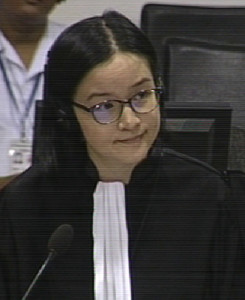
Nuon Chea Defense Counsel Doreen Chen
She did not know which division her battalion belonged to. The battalion chiefs were Chhung, and Phan. Ms. Chen referred to another person’s testimony, who had said that his battalion – also staying near Wat Phnom – belonged to Division 302. He had also said that his commander was called Oeun.[1] The Civil Party could not remember either. She never carried any weapons to the front, only ammunition. The rear battlefield was near Prasat Mountain and the front battlefield was in the forest of that area. They would carry the goods in the evening and arrive at night time. They would first store them in an office. She was first transferred to Calmette Hospital and then elsewhere.
During a meeting with all forces of her battalion, they were informed of the division of forces that day.
Getting married
Turning to her next line of question, Ms. Chen wanted to know whether her interrogator gave her more details on the activities she was accused of. She replied she did not know about the networks she was set to be part of.
After being interrogated, she was sent to Steung Kangdeut. She learned that it was the influence of “the leaders”. “They said that we were influenced by the leaders”. All of the people who were interrogated said that they did not know about this. “I did not know the leaders at all”. They did not mention specific names.
Ms. Chen then inquired whether Phan was her unit chief. She replied that he was the chief of the male and female unit. “He was the one who asked me about the marriage”. Phan assigned the work.
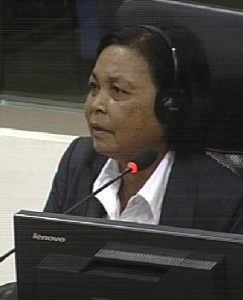
Civil Party Chea Dieb
Ms. Chen asked whether she was accused of having a fiancé the first time that she was asked to marry and refused. Ms. Dieb confirmed this. The second time she was accused of having a boyfriend in the ministry. “So I had to submit myself to the request by Angkar”. She said that “Angkar could do whatever it wanted” and that she could be surveilled if they thought that she had a boyfriend. “I told him to conduct surveillance.” She told him that she would accept punishment if she had committed moral misconduct.
Ms. Chen then wanted to know how she knew that she could not refuse anymore when they asked her the third time. She replied that others did not refuse and that she had already refused twice. “I started to feel frightened”. She also could not think of a reason to refuse: “I could not find any words to refuse”.
No one could go home and visit their families. Her husband never visited his family members. They learned that they had lost their family members after the regime.
The couples did not ask relatives about their opinions for the marriages. As for her age, she said that she was born in 1954. She did not know at the time how old she was at the time. “I presumed I was 19 or 20”. She got married during Democratic Kampuchea.
The handicapped soldiers they were part of the North Zone. Asked how she knew that the handicapped soldiers were married because they could not fight any longer, she replied that there were other handicapped soldiers. Some were sent to the Ministry of Commerce, and others were sent to build houses. This depended on the ability to work. No one came to attend the marriage ceremony. She did not witness other wedding ceremonies.
She confirmed that “they have moral rules. We were asked to be clean. And I learned that the children of the leadership were divided from one another.”
Moral misconduct
Ms. Chen then read out the Sixth Revolutionary Principle: “Do not behave in any way that violates females.”[2] She replied that she had not heard about this, but that they were prohibited from engaging in any moral misconduct. “The matter was reiterated in each meeting”. They knew that they were under monitoring the first night of their marriage. She had been aware of this previously, she said. Ms. Chen referred her testimony of yesterday in which she had said that she was warned that she was monitored. She wanted to know who warned her. She replied that it was an elder woman who was a cook. She warned her that they were monitored, because they did not like their husbands. She did not find out who these people were. The chief supervised both female and male units. The militiamen had several duties, including monitoring the members of the units. She did not know “much” about their assignments at night time, but she heard their footsteps and she had heard about their monitoring activities before. With this, Ms. Chen concluded her line of questioning.
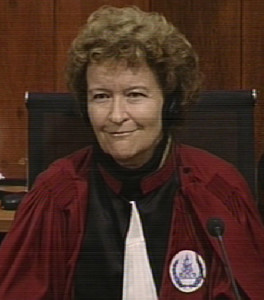
Judge Claudia Fenz
Judge Claudia Fenz had a few follow-up question. She asked what would happen if it was found out that people engaged in moral misconduct. She replayed that she never engaged in moral misconduct: “I never played around with anyone”. She “stood firm” when he accused her of having engaged in misconduct. She said that people disappeared when they engaged in moral misconduct, but she knew of a case in which the couple was married afterwards. She only witnessed that case. “Before that, I did not witness anything”. If she was accused of committing moral misconduct, she would not be asked for justification. They would send her to the upper level and would not ask about any reasons. “They never come to ask, ‘Comrade you were accused of engaging in moral misconduct, what is your excuse’”. The people would simply disappear. She was afraid that she would be accused of having committed moral misconduct or engaged in traitorous activities.
At this point, the President adjourned the hearing for a break.
Khieu Samphan Speeches and Meetings
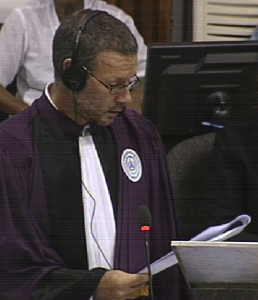
Senior Assistant Prosecutor Vincent de Wilde
After the break, the floor was granted to the Khieu Samphan Defense Team. Anta Guissé asked about the dates of the speeches given by Khieu Samphan. She could not remember when she got married. Ms. Guissé quoted her first Civil Party application, in which she indicated that she married around six months after she arrived in Phnom Penh.[3] Senior Assistant Prosecutor Vincent de Wilde objected and said that it was only six months after working at a specific location, and not necessarily in Phnom Penh. She had mentioned that she worked at Orussey for that time. Ms. Dieb could not remember when she started working in Orussey. She said that “it was a bit long after I arrived in Phnom Penh”. To her recollection, she got married six or seven months after she “took rest” in Phnom Penh. Ms. Guissé when wanted to know whether she saw Khieu Samphan for the first time at Borei Keila and whether this was before or after her marriage. She replied that she got married long after having met Khieu Samphan for the first time.
Ms. Guissé wanted to know who invited her to attend the meeting or trial at Borei Keila Stadium. She could not remember who invited her. Upon her arrival she saw other people, so she was relieved. She was not informed in advance of the meeting. She was at Psa Chas transporting goods at the time. Her direct supervisor was Mon. She was the only one from her unit who attended the meeting. “He saw me firm and serious, so he would send me to any other places when he wanted”. She was in a meeting when the announcement was directed to the messengers to make speeches. At this time, Khieu Samphan was on the stage. She could only hear the speeches of the messengers, and then fell sick, so she was sent out. She left after around one hour. She was told that Khieu Samphan was “an advisor”, but she did not know what this meant. She was sent to a hospital after one hour. She could not remember the names of the messengers. Participants in the event were from other units. She only knew about her unit, namely the War Spoils Unit.
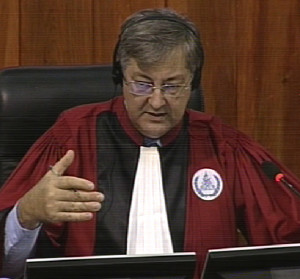
Judge Jean-Marc Lavergne
Ms. Guissé wanted to know what she recalled regarding the biographies of Hu Yuon and Hu Nim. She replied that one of the messengers said that “he mistreated people”, but that she could not recall anything else.
As for the meeting at Wat Ounalom, she recalled that her chief invited her when she was at Tupl Tom Poung. About ten people from each spearhead were instructed to attend the meeting. “The hall was full”. The meeting was held at the lower level of the temple. There were chairs and tables that filled the hall underneath the temple. Participants were from various spearheads. There was no one else, she said. Phan and Mon were also present. They only listened, however, and did not take the floor.
Ms. Guissé then sought clarification regarding Ms. Dieb’s arrival at Chey Dong Pagoda. She replied that she ran from Samraong District. The leader at Sleng Pagoda was arrested. Some of them disappeared during night time. Thus, she was afraid that they would be killed during night time and they decided to run to Chey Dong Pagoda, because she had heard that it was under the supervision of Khieu Samphan. She stayed there for around two weeks, but did not see him. She was transferred elsewhere with around ten other people. Some of them were sent to work in the rice fields, while others were sent to grow vegetables. She was in the latter group. It was the chief who encouraged them to flee. The next morning, messengers came to ask him whether he saw a group of around ten women who fled. At this time, they were hiding in the house of that chief. He told the messenger that he did not see any of them.
Ms. Guissé asked whether she recalled that she filled out the Victim Participation Form in 2009 and whether she remembered providing supplementary information in 2013.[4] She said she could not remember. Ms. Guissé inquired about her supplementary information form.[5] She said that she saw Khieu Samphan at two occasions. Ms. Guissé wanted to know why she had not mentioned the meeting at Wat Ounalom in her first application. International Civil Party Lead Co-Lawyer Marie Guiraud said that this document was provided by the OCIJ as part of Case 004.[6] Ms. Guissé said that her question remained the same and wanted to know why she did not talk about “this particularly rare events” before May 2013. She could not recall the dates that she filled the information form with.[7] Ms. Dieb replied that she did not know who was responsible for filling in the form, since she filled it in a long time ago. Ms. Guissé said that she had given substantial new information and was wondering whether her memory might have been distorted by the time. Ms. Guissé said that she was entitled to ask these questions.
Judge Fenz interjected and asked the Civil Party whether she was sure that these meetings happened, which the Civil Party confirmed. She insisted that she had met Khieu Samphan twice. She said that she would have filled in that information, but that she was assisted. She said that she remembered telling her lawyer in 2014 that she mentioned it, but did not know whether she mentioned it previously and if she did not, why.
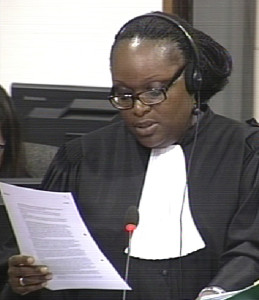
Khieu Samphan Defense Counsel Anta Guissé
Ms. Guissé said that the name of Hu Nim appeared on the S-21 list as having entered the prison in 1977.[8] She could not recall the day and month. She did not see Hu Nim and Hu Yuon at the time. At this point, the President adjourned the hearing for a break.
Civil Party Impact Statement
After the break, the Civil Party was given the opportunity to make an impact statement.
I would like to inform eh chamber of the suffering that I underwent from the period. I was so painful, particularly when I was forced to get married. I lived my life unhappily. And I got married without the consent and agreement from my parent and siblings. I was so painful as well, because I lost my relatives and siblings during the Khmer Rouge time. My biological sibling, my elder sister, who took care of the younger siblings – that is feeding the children and taking all of us along with her – died in the period. She lost her life. After she got married, and had children, all of her five children were killed in kampong Thom. It is so painful. As for my third younger brother, he went to work at the cotton plantation and one day, he was called by his friend to cut the coconut trees. At the time, he saw a man and a woman committed moral offense. He ran back to his home and saw his mother and told the mother about the fact that the lady and the man were having sex with one another. The day after, he was arrested. At the time, he was arrested with another man and the man was trying to help him.
All of our siblings and relatives were living in a small house and we were trying to flee to Kampong Chhnang. We arrived at night, but the day after in the morning, he was arrested and he was tied to the sugar cane plant. He was hit and beaten. My younger brother, was hit and beaten. I could not help him. Later on, my younger brother was thrown into the well. I was trying to ask his whereabouts but I could not find him. After the regime in 1979 up to the present time, when I’m working in the field I still recall my younger brother and all of my relatives who died during that period. It is so painful to me, Mr. President. After the fall of the regime, what I have had, is the pain that I have had with me until today. It is unforgettable, the bad experience that I went through.”
She then put questions to the accused and asked
Why people were made to work like animals and why weren’t they given enough food to eat, because there was huge production of rice. Another question is, before the Khmer Rouge time I was living in Phnom Penh. However, when I lived in the Khmer Rouge time, we were accused of being influenced by the senior leaders. I went to Tuol Sleng, I went to Choeung Ek, I saw that people were killed in that period. So why were all [these people] killed in that period?
New Witness: Phan Him
The President informed Ms. Dieb that the accused exercised their right to remain silent. He then thanked her and ordered to usher in new witness 2-TCW-914. Phan Him was born in Kampong Cham Province. She confirmed that she worked in a commerce office in Chuk Commune.[9] She went to the battlefield on January 8, 1975, to carry wounded soldiers. She was sent to “do the cleaning” at Psar Thmei after the fall of Phnom Penh. When she was in charge of the commerce warehouse, there were many employees. She was removed and sent to the Old Stadium. She was then reassigned to Psar Thmei. When she was working at the Logistic Unit, people form the north were not arrested yet. She was forced to work day and night. When people arrived on trucks, they were asked to cook vegetables. Some colleagues of hers collapsed and were sent to the hospital. They were accused of poisoning the workers. “I and my colleagues did not poison the workers”. The day after, the vehicle came again. People from the North were arrested, because these people were accused of being traitors. After this arrest, all of them, including the witness, were sent to Psar Thmei. They were asked to join a criticism session at Psar Chas. The name Koy Thuon was mentioned. Theng mentioned that she was raped and the husband of Theng was sent to Kampong Som. She and her husband were allowed to see each other every once in a while. During the time, Ka Mei felt pity and told Theng’s husband about the rape.
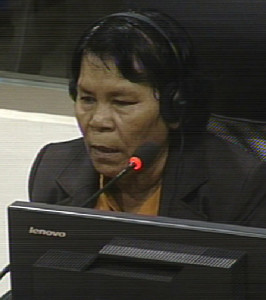
Witness Phan Him
She was there for around four or five months. She was “tempered” and they were sometimes given only gruel mixed with corn. She was assigned to children’s education in May 1977. Prior to this, they were sent to a session to denounce traitors. Some people stole rice from the warehouse. She spent around a month at Tuol Tom Poung teaching children. She was then assigned to manage wares. It was around one kilometer away from Psar Thmei. Mr. Lysak asked whether it was correct that she was still single in October 1977 as indicated in her biography. She answered that she was in the mobile unit until 1978. She got married in November 1978 and went living with her husband in the ministry of finance.
Ta Ryt was superior to Ta Hong. He was part of the Ministry of Foreign Affairs. Ta Hong was in charge of domestic affairs. Ms. Him did not know who Ta Ryt reported to.
Sar Kim Lomouth, 31 May 2012 had said on 31 May 2012 that Bong Him and Bong Vorn were the superiors of the Ministry of Commerce.[10] Mr. Lysak asked whether she knew a cadre called Lomouth. She said that she knew this person, but did not know which position he held. She did not know whether Khieu Samphan had any contact with Ta Ryt for the commerce. She never saw Khieu Samphan there.
Marriage
Mr. Lysak then inquired how she got married. She recounted that all people in her group got engaged a month or two before her marriage in November 1978, but she was only told on the day before her wedding. She refused, but was told that despite her refusal she would have to marry. There were 21 couples and she was part of the last couple. She kept quiet after she was warned that she should not refuse. They were instructed to sit in a row. They were let out to have meals after the marriage. She did not know her husband previous to her wedding. He worked in Ta Ryt’s office. She kept refusing from 1975 onwards, “but by 1978, I could no longer do that”. There were a few unit chiefs who participated in the ceremony. Her parents were not aware of her marriage. They were told to love one another and to be loyal to the party.
After the marriage, she lived at Ta Ryt’s location for two or three months before the Vietnamese arrived. She was told that her husband would come and visit her once a week, but this did not take place. She was told to prepare her stuff and live with her husband. She was assigned to work in the kitchen.
Spouses
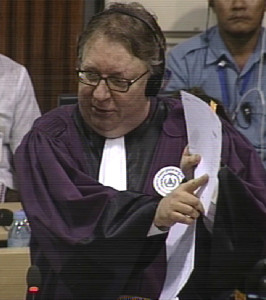
Senior Assistant Prosecutor Dale Lysak
After the last day of the break, the floor was given back to the Co-Prosecutors. Mr. Lysak continued asking about forced marriages at the Ministry of Commerce.[11] He wanted to know how many people worked at the Tuol Tom Poung warehouses in total when she worked there. They would transport things to Kampong Som. Amongst the 21 couples, including those from the expert section, three other people came from his husband’s department. Mr. Lysak said that a person Ruos Suoy had talked about his involvement in arranging marriages in warehouses.[12] The warehouse was “located at Kilometer 6”. When Mr. Lysak put a question about Khieu Samphan, National Defense Counsel Kong Sam Onn objected and said that she had already said that she did not know Khieu Samphan. Mr. Lysak said that his objective was to find out whether she had heard about Khieu Samphan conducting study sessions. Ms. Him denied this. Neither was she aware about a study session that today’s Civil Party Chea Dieb had mentioned. Four of the 21 couples went to the Finance Ministry, while the others remained at the mobile unit stationed at Tuol Tom Poung.
Mr. Lysak turned to his next line of question and wanted to know whether she attended any political training session in which Nuon Chea was present, and if so, if she could describe that meeting. She answered that she was called for a meeting at Borei Keila, in which Nuon Chea instructed them to abide by the Party’s discipline and work hard. This meeting took place after she got married in 1978. Nuon Chea also spoke at this meeting. Mr. Lysak read an excerpt, in which it was said that Nuon Chea talked about arrests of traitors of “Koy Thuon’s group”.[13] She replied that she could not remember. When she attended the study session at Borei Keila, there was no announcement about Koy Thuon. This took place only when she was at Psar Chas. Ta Hong opened the session then, and they talked about Koy Thuon back then. There were participants from the ministry of commerce, from Psar Chas, and from Psar Thmei. This one study session was led by Nuon Chea. It lasted for one day and the hall was “fully occupied”. She did not know about the playing of Koy Thuon’s confession.[14]
Mr. Lysak further inquired whether she ever saw someone arrested and taken to Pochentong Airport. She replied that two or three days after the study session at Psar Chas people arrived on a truck. They wore weapons and took some people of her unit away. They did not know where these people were sent to. This was at the office at Psar Thmei. That event occurred a few days after the study session. The next morning, they learned that the two cadres Py and Doeun had disappeared. She was tempered near Pochentong and this was the place where people were arrested.[15] They had a list when they arrived. A few days later, the vehicle arrived again and four or five people were arrested. Four or five days later, the vehicle came back and her name was called. The vehicle was full, however, and she was told to wait until the next vehicle.
His elder sibling was accused of being a soldier.[16] Family members of her aunt was also accused of being a traitor. All her family members were taken away and killed. Her brother was a soldier during the Lon Nol regime. She explained that he was forced to join the army and did not join voluntarily. He did not receive salary. After one month, her brother discussed with her father and decided to escape from the army. His wife was also taken away and killed. She was pregnant at the time. She did not know the age of the son, since she had already left the village.
Her brother told her what happened to her older brother.
Consummation of Marriage

International Civil Party Lead Co-Lawyer Marie Guiraud
The floor was granted to the Civil Party Lawyers. International Civil Party Lead Co-Lawyer Marie Guiraud asked whether she had to consummate their marriage on the day that she was married. “No one told me about that. However, I was transferred from Tuol Tom Poung […]. He was living in a small room. No one told me about what to do in fact after the marriage”. Her husband started mentioning his background and she started to feel pity for him. Thus, they started living as husband and wife. She was not pregnant during Democratic Kampuchea. She was pregnant when living in the refugee camp. Some women fell pregnant “right away” while some others became pregnant at a later stage. She met him again at the Thai-Cambodian border. With this, Ms. Guiraud handed the floor to Lor Chunthy. The 20 couples knew about the marriage one month before, but she only knew it the evening before the wedding ceremony took place. She said that she did not want to get married, but she was told that she had to get married. She was afraid that she would be taken away. “Those who were living at Tuol Tom Poung were living happily together”.
He then asked her about her task as a “vendor”. She said that she had to register how many kilograms of for example pork or rice she had received. She had to weigh them for others. If there was a remainder, she had to send it to Pochentong to keep this in a freezer. “There was no exchange of money”.
She knew children who were orphans. These children were sent to the orphan unit. She did not go to visit her house after she had left. Only once: “Leng became a psychotic person” and he lived in Wat Ounalom. She started beating her, and that was when she started to realize that he became a psychotic person. This was the moment when they said that he had to be taken away. “He took off his clothes and walked around. So everyone decided to put him in a room in the upper part of the building. Then, he was sent to a hospital, and there he beat and hit the hospital staff”. After this, she took him back. Thy arrested him. She was told to bring him to Prey Char, after which she took him home. After this time, they were requested to live in a collective community.
[1] E1/320.1, June 23, 2015, Sem Hoeung, 9:52. E3/307.1, June 17, 2015, at 15:48.
[2] E3/765, at 00539994 (EN), 00376493-94 (KH), 00540024-25 (FR).
[3] E319/54.5.8, English ERN ending at 644, 01049379 (KH), no French translation.
[4] E319/45.4.8, at 01049379 (KH), 01139644 (EN); 01049384 (KH), 011399647 (EN).
[5] E3/5010a.
[6] E319/45.4.8.
[7] At 01049379 (KH), 01139644 (EN).
[8] E3/8463.
[9] E3/9318, at 00057998-58000 (KH).
[10] E1/79.1, at 14:33.
[11] 27 May 2013.
[12] E3/10620, at answer 75.
[13] E3/9318, at 00058269-270 (KH), 00679670 (EN), 00611552 (FR).
[14] E3/469, at 00172052 (KH), 00205113 (EN), 00524390-91 (FR).
[15] E3/9318, at 00058271 (KH), 00679672 (EN), 00611554 (FR).
[16] E3/9318, at 00679667 (EN), 00058266 (KH), 00611549 (FR).
Featured Image: Witness Phan Him (ECCC: Flickr).
